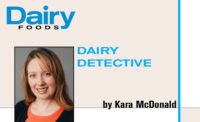Maintaining independence
According to a consumer study commissioned by the U.S. Dairy Export Council, adults age 40 to 75 believe healthy aging is an attainable goal. Following a balanced diet and maintaining good nutrition is a core belief of achieving healthy aging, according to consumers. They also believe that the foods they eat will have an impact on their long-term health.
“Nutrition research continues to build support for the valuable role of dairy and its unique nutrient package as part of a healthy diet to help reduce the risk of a number of health conditions,” said Keigan Park, director of nutrition research at the Dairy Research Institute, Rosemont, Ill. “We know that many of dairy’s nine essential nutrients, including protein, calcium and potassium, are of particular interest to seniors hoping to maintain their activities and independent lifestyle.”
Sarcopenia, or muscle wasting, is a common concern among the aging. This condition is estimated to affect as many as 30% of people over age 60. While muscle loss occurs naturally in people over age 45, consuming protein at a higher amount than the recommended dietary amount can provide a means of reducing the progressive loss of muscle mass with age. Research has found that among one group of adults, those with higher protein intakes over a three-year period lost 40% less lean mass than those with lower protein intake.
Additionally, studies suggest that consuming adequate amounts of protein at every meal, not just dinner, helps optimize muscle-building benefits. Published research recommends that approximately 30 grams of protein are needed at every meal to help stimulate muscle growth. Dairy proteins in the form of whey protein and milk protein offer substantial opportunities to today’s food and beverage manufacturers to help address the nutritional needs of aging consumers.
Whey protein is a high-quality protein naturally found in milk that contains all the amino acids the body requires for muscle protein synthesis. It is highly digestible (~95%) and rapidly absorbed by the body. Milk protein concentrates — 80% to 85% (MPC) — and milk protein isolates offer food and beverage manufacturers options to increase protein content in formulations without significantly increasing the lactose content in the finished product, while still maintaining a clean dairy flavor. Like whey protein, MPC is also a multifunctional ingredient that provides benefits such as water binding, gelling, foaming, emulsification and heat stability.
Additionally, dairy proteins provide formulation versatility and neutral flavor profile, making them an ideal choice to fortify breakfast or snacks with added protein. Calorie for calorie, protein can increase the feeling of fullness more than carbohydrates or fat.
USDEC has developed a number of application ideas showing the latest ways to tap into the nutritious profile of dairy ingredients — from dairy proteins to yogurt, and from cheese to permeate. Many of these application ideas were on display at the IFT 2012 Food & Expo in Las Vegas. USDEC experts and affiliated researchers explained to potential partners how U.S. dairy ingredients can make the difference in providing value in product innovations.


